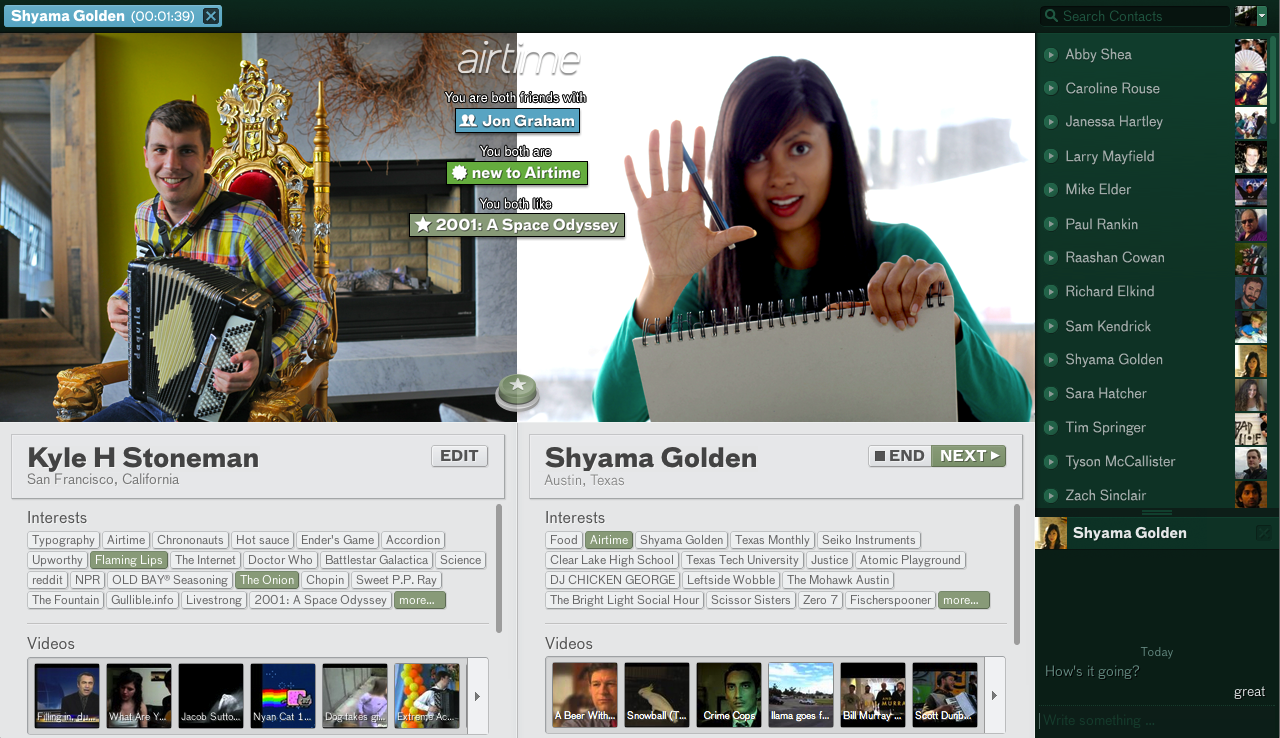One minute into using Airtime I was laughing with someone I’d never met. That’s something special when despite all the asynchronous connection, the Internet threatens to make us feel lonely. On Airtime, you experience together thanks to real-time video chat and video sharing. You’re both the performer and the audience. When you look at your friend or a stranger you’ve been paired with, you get their body language, gestures, and attitude. Co-founders Sean Parker and Shawn Fanning tell me that on Airtime “there’s a depth of communication that doesn’t come through on something like Facebook. It’s much higher bandwidth.”
The Internet doesn’t have to isolate us. In fact, it’s a party, and Parker and Fanning aim to be the hosts. “Airtime relates people to each other, makes the connections as comfortable as possible. But without a facilitator [like Airtime], the fear of rejection is so powerful” Fanning adds. “People are way more entertaining than we give them credit for” Parker adds.

Long ago when Airtime’s founders met over IRC, real-time chat was the medium of choice, and interactions seemed more genuine. But as content feeds took over we began shouting into the darkness, and going through the motions of checking for Likes and retweets, the simplified symbols of human connection.
But oer the years the groundwork was laid for a more realistic interaction medium. Parker tells me there’s four reasons Airtime wasn’t possible until now:
- Flash, the technical foundation of Airtime, finally works peer-to-peer. This allows for high-resolution real-time video communication from the browser without the need to install software, and without a prohibitive strain on centralized servers.
- The widespread deployment of webcams. “800 million webcams will ship this year, 2x what shipped last year. That represents an inflection point.” Now most people have webcams, and that wasn’t true a few years ago.
- Broadband deployment has reached the point where it can support high-definition video for most people.
- Facebook has become nearly ubiquitous. “It’s not the perfect representation of the real world social graph, but it’s close and it’s the most complete.” You don’t want to go re-create the graph, but you can leverage it to connect people.
Combined with Airtime’s design where both conversation partners share the screen equally, these permit for some of the most vivid human interactions the web has seen.
Today you can video chat with one person on Airtime, or pull in videos from sites like YouTube to watch together, but Parker tells me Airtime is considering group chat and synchronous music listening. It also has firm plans to become an app platform, so third-party developers can build new ways for us to share. And finally, Parker says mobile apps are “coming very soon. The most important experience that’s missing right now is just this seamless web experience but we’ll follow up soon with apps for iOS, Android…”
There are other ways to communicate with video, but they’re tethered into desktop apps like Skype without good content sharing options, or lesser-used social networks like Google+ Hangouts that could require you to sign up for a new account. Parker tells me creating Airtime seemed obvious considering the friction involved in watching a video together with his fiance when they were apart. “I’d call her on the phone, [tell her which video to watch], and sit and listen to her reaction. It’s sort of weird. We should be able to experience content together in a shared space.”
Airtime hopes to trump competitors with convenience, the same philosophy that led Parker to see Spotify as the solution to music piracy. If one of your friends is online on Facebook, they’re on Airtime, and you can instantly send them an invitation to talk that’s delivered via Facebook Chat. If you want someone new to share with, Airtime pairs you with people who are nearby, share interests, or have mutual friends. Moments later you’re expressing yourselves, giggling as you show off your favorite viral videos, and learning more about each other.
It’s that last part that makes Airtime so unique. Whether you’re chatting with a friend or someone new, Airtime lets you leapfrog forward in the intimacy of your relationship.

A New Kind Of Intimacy
You might be sheepish about immediately bringing up your love for World Of Warcraft that’s quietly listed in your Facebook profile. But Airtime highlights you and your partner’s shared interests, even scrolling them down the center of the screen if you need something to talk about. Discussions turn to what makes you two similar, but different from the rest of the world. Your esoteric bond over a book, band, brand, or film can quickly bring you closer than a dozen small talk conversations.
Suddenly strangers don’t seem so strange, you realize how much you have in common with your co-workers, and friendships are accelerated. Airtime makes it seem like you’ve known someone longer than you have.
“If you connect millions of people to each other [in an environment] that’s well-lit, safe, and controlled enough to prevent bad actors, people will do all sorts of [interesting things]” says Parker. He explains that “When everything you do is seen by everyone, you end up self-censoring and choosing lowest common denominator. It’s noisy, boring, and impersonal. Rarely do you have a meaningful one-on-one connection.” In private Airtime chats, though, people become their real selves.

Honestly, with every service importing our same Facebook friends it felt like our formative years were over and we were locked into our social graphs. The Internet was starting to get a bit repetitive. Airtime lets you strengthen the ties of your graph, but also break out of it.
Of his time as President of Facebook, Parker exclaims “I spent 10 years with identity trying to create the one true social graph, but no one is asking how do you rewire it to more ideally connect people. We’re taking everything I’ve spent 10 years working on and turning it on its head, doing the opposite.” Fanning concludes “There’s no reason not to continue meeting new people.”
